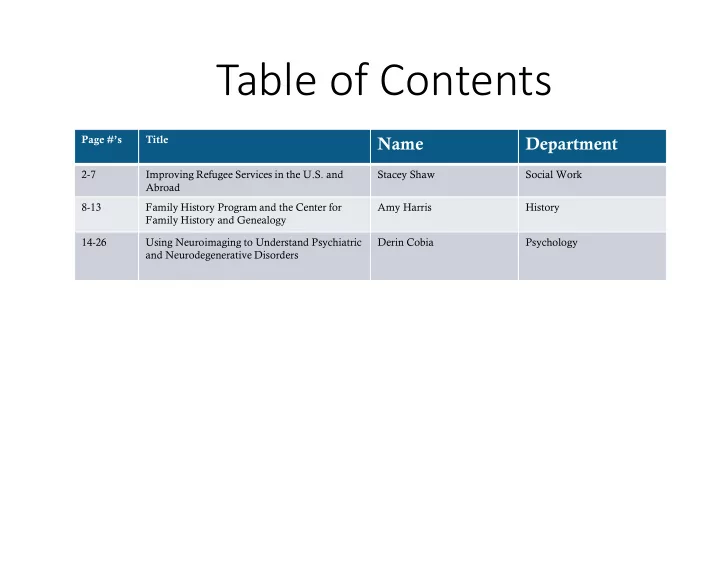

Table of Contents Page #’s Title Name Department 2-7 Improving Refugee Services in the U.S. and Stacey Shaw Social Work Abroad 8-13 Family History Program and the Center for Amy Harris History Family History and Genealogy 14-26 Using Neuroimaging to Understand Psychiatric Derin Cobia Psychology and Neurodegenerative Disorders
Improving r refugee s services in the U U.S. S. an and ab abroad Stacey Shaw Social Work stacey_shaw@byu.edu Areas of Interest: Refugee resettlement and mental health, religion/spirituality and health
Hi, my name is Stacey
You may have heard…
Our call to action: • We must be careful that news of the refugees’ plight does not somehow become commonplace when the initial shock wears off and yet the wars continue and the families keep coming. • each one of us can increase our awareness of the world events that drive these families from their homes. We must take a stand against intolerance and advocate respect and understanding across cultures and traditions.
In progress • Group supports for refugees in Malaysia: mental health, parenting, physical health • Building comprehensive, equitable services in the U.S. • Training at camps in Thailand • Examining the role of religion in coping/adjustment
Let’s work together
Family H Histor ory P Prog ogram a and t the Cen enter for F Family H History a and Ge Genea ealog ogy Jill Crandell Amy Harris History History Director for the CFHG FH Program Coordinator jill_crandell@byu.edu amy.harris@byu.edu (801) 422-2944 (801) 422-6408 Areas of Interest: Areas of Interest: Family History, British History, Family History, Mormon History, Siblings, Families and Poverty, Software Development, Women and Gender, Paleography Prosopography
Familyhistory.byu.edu
Family Hi Histor ory BA The overall purpose of the BA in family history is to educate students in methodologies and resources used for historical family reconstitution in order to explore, from the perspective of the family, how human societies function and change over time. It is meant to prepare students for careers in family history related fields as well as to more broadly understand and appropriately analyze their world with an historical perspective in a manner that spiritually strengthens each student. https://learningoutcomes.byu.edu
Center r for r Family History and Genealogy • Projects • Nauvoo Community Project • Immigrant Ancestors Project • Script Tutorial • Bertram Merrell’s Index of English Marriages • Welsh Mormon History Project • Discovering English Ancestors • Family History Companion • Faculty involvement and History department support • Tenure-track professional faculty member as director • Part-time staff member (in addition to student employees) • History department faculty as project supervisors and mentors • Student employment • Over 40 students each semester • Donors and internships • Provides scholarship money to support 10-15 interns each year – all internship beyond the Wasatch Front (local internship have other supports)
Research Grants https://cfhg.byu.edu/Pages/faculty-research-grants.aspx
Familyhistory.byu.edu
Understand Psychiatric and Neurodegenerative Disorders Derin Cobia, PhD Department of Psychology derin.cobia@gmail.com Areas of Interest: - Neuropsychology, Neuroscience, Psychosis, Dementia - Utilizing neuroimaging to study how changes in brain structure and function influence cognition and behavior
Neuropsychology = +
Neuropsychology IQ Attention/Concentratio n Processing Speed Language Visuospatial Memory Reasoning
Neuroimaging
Cortical Thickness
Computational Anatomy 1. Large-deformation maps • Building atlases • Mapping correspondences through maps 2. Probability laws • Computing averages • Statistics on maps 3. Inferences • Hypothesis testing • Classification ➡ CA focuses on the quantitative analysis of shape variability of biological structures Miller (2004), Neuroimage
Questions • What kinds of anatomical abnormalities exist in individuals with brain disease? • Where? In what way? • Do brain differences relate to their clinical and cognitive presentation?
Heterogeneity in Schizophrenia 1.0 0.5 Z-score 0.0 -0.5 -1.0 -1.5 COM NPNN Cobia et al. (2011) Schiz Research
Brain Mapping Cobia et al. (2009), Schiz Research
Subcortical Shape Surface maps of thalamic shape deformations between groups (studentized- t ) Rig Lef Rig Lef Lef Rig Rig Lef Rig Lef ht t ht t t ht ht t ht t Characteristics NPI vs COM View: Anterior-Lateral Anterio Posterior Superior Inferior r NPNN vs COM Inward Deformation Outward Deformation - 0 3.0 3.0 al. (2011)
Basal Ganglia Caudate Anterior Pallidum Anterior Posterior Putamen Superior Inferior al. (2014) AFF Inward Deformation AFF Outward Deformation
Neurodegenerative Disorders • Primary Progressive Aphasia • Language-based Dementia Syndrome Mesulam et al. (2009), Arch Neurol
Clinical Utility Ultimate goal: • Biomarkers & Endophenotypes • Associated with illness • Heritable • Stable trait • Co-segregates with illness in families • Found in non-affected family members Gottesman and Gould (2003) Am J Psychiatry
Recommend
More recommend